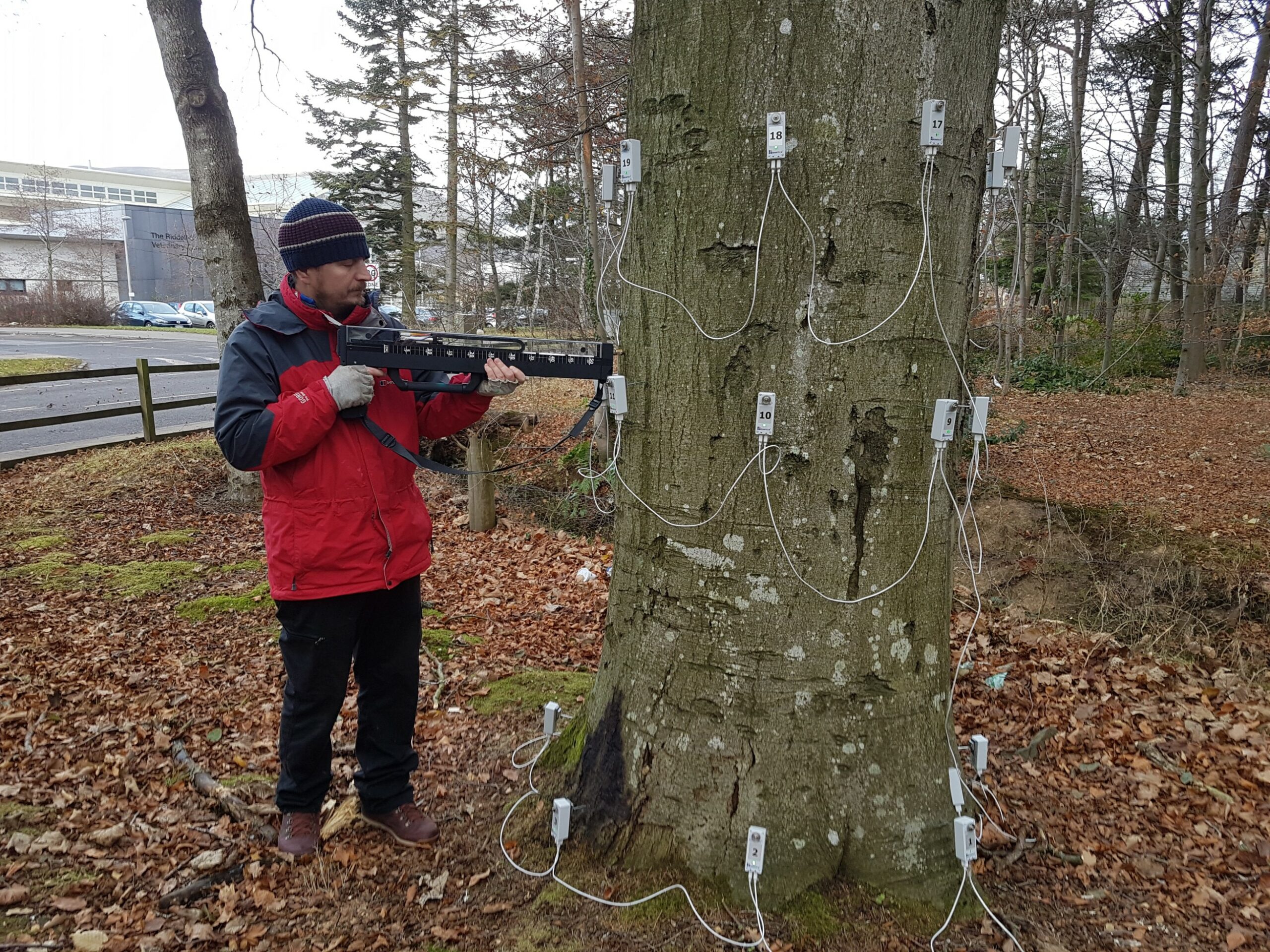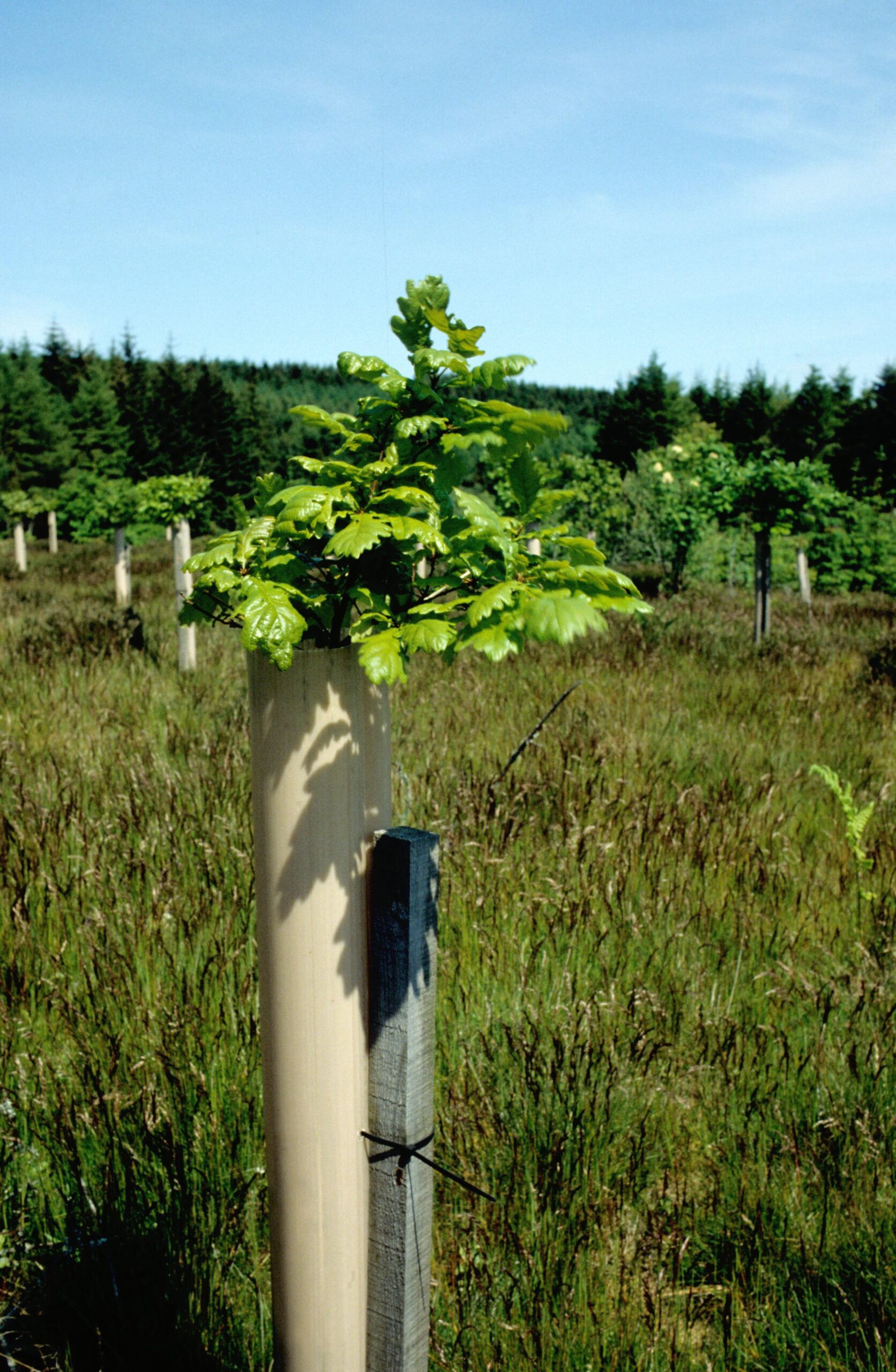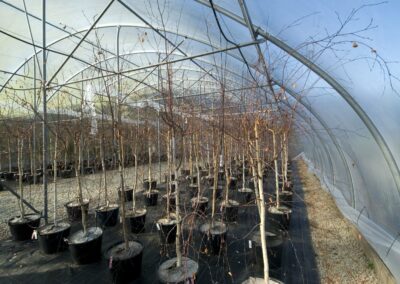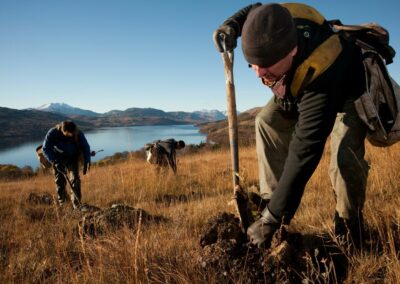Detecting and understanding oak shake
Project leads Adam Ash, Dr Joe Beesley | Forest Research; Dr James Borrell | Royal Botanic Gardens, Kew
Lead organisation Forest Research
Collaborators Royal Botanic Gardens, Kew; Edinburgh Napier University
Project status Active
Project funding 25-26 £249,310
Research outcomes Reducing the risk | Adaptation
Context
Oak (Quercus) is a crucial broadleaved tree species for biodiversity and hardwood timber. However, oak can be affected by a condition known as oak shake, which causes stem cracking and reduces the value and long-term use of harvested timber. There are several biological factors and environmental triggers known to contribute to shake, but the exact causes are not yet fully understood.
As the UK undertakes widespread woodland creation, oak is one of the most commonly planted species. This makes shake a critical economic risk for new oak woodlands intended for timber production and carbon net zero goals.
Research aims and objectives
Aim:
Improve understanding of the drivers behind oak shake, by studying known biological factors and environmental triggers, and linking the presence of shake with external indicators, such as stem form, acute oak decline, and the timing of bud-burst.
Objectives:
- Develop a non-destructive testing methodology to detect oak shake within standing trees using:
– sonic tomography
– resistance microdrilling - Undertake shake assessments on standing oak trees that have had their full genetic makeup studied, using the non-destructive testing methodology, and identify possible genetic and environmental factors linked to shake.
Expected outcomes
- An improved understanding of what makes oak trees more likely to develop shake, what environmental conditions trigger it, and how these factors work together.
- Non-destructive testing methodology developed to detect shake in standing trees.
- Enhanced understanding of the genetic traits that make oak trees more likely to develop shake.
Further resources linked to this project
Report instances of oak shake this felling season - Forest Research
Gathering evidence on oak shake is very important and your observations can make a real difference. By reporting instances of shake, woodland owners can contribute to this research project. For more information, see Report instances of oak shake this felling season – Forest Research.
CFP Intern - Flynn (2025-2026)
Find out how intern Flynn is supporting this project throughout his sixth-month Centre for Forest Protection internship (Oct 25 – Mar 26):
Title image: Resistograph device being used to assess the condition of a tree – Dr Steven Adams, Edinburgh Napier University
Body image: Young Oak in Tulley tube – Crown Copyright. Forestry Commission – Isobel Cameron
Glossary & Key Terms
Acute oak decline (AOD)
Acute oak decline is an emerging disease of oak trees (trees in the Quercus genus) which was first observed in the UK late in the 20th century. It can kill oak trees within four to six years of the onset of symptoms.
The disease is found mostly on mature oak trees, but younger trees can also be affected. It is caused by multiple agents, especially bacteria, and thousands of trees are affected. For infection to occur, it is likely the trees need to be weakened (predisposed) by certain factors, especially environmental factors. For more information, see Acute oak decline – Forest Research.
Broadleaved
A category of trees that have wide, flat leaves rather than needle-like leaves. A category of trees that have wide, flat leaves rather than needle-like leaves. These trees are usually deciduous and lose their leaves in winter.
Oak (Quercus)
Oak trees are a group of trees and shrubs belonging to the genus Quercus within the beech family. They are known for their distinctive lobed leaves, hard wood, and characteristic acorns. There are around 500 different species of oak, found in the Northern Hemisphere, and they can be either deciduous or evergreen.
There are two native oak species in the UK: pedunculate oak (Quercus robur) and sessile oak (Quercus petraea), and three non-native species: turkey oak (Quercus cerris), holm oak (Quercus ilex), cork oak (Quercus suber). For more information, see Oak Trees – Forest Research.
Oak shake
A condition affecting oak trees that causes stem cracking, which significantly reduces the value and long-term usability of harvested timber. Whilst several biological factors and environmental triggers are known to contribute to shake, the exact causes remain unclear.
Resistance microdrilling
A minimally invasive testing technique that measures wood resistance using a fine drill needle.
Sonic tomography
A non-destructive testing technique that assesses the internal condition of trees by analysing how sound waves travel through the wood.
Stem form
The way that the trunk of a tree grows – this includes characteristics such as the straightness, taper, branching pattern, and overall shape of the tree stem.
Share this project on social media
Related Projects
Our Partners
Social media
Explore
Newsletter
Contact
© 2026 Centre for Forest Protection. All rights reserved.



